Single bolus dexmedetomidine versus propofol for treatment of pediatric emergence delirium following general anesthesia
Co-first authors Xuemin Han and Xin Sun
Clinical trial number: ChiCTR2000039021, Registry URL: www.chictr.org.cn
Funding information
Grant support for this study was received from the Minsheng Science and Technology Foundation of Soochow (No.sys2018072).
Abstract
Background
Pediatric emergence delirium is a psychomotor disorder occurring in the early postanesthetic stage. There is no clear consensus regarding its treatment; however, dexmedetomidine and propofol have both been shown to be effective.
Aim
In this single-center, randomized, double-blind prospective study, we compared the efficacy of dexmedetomidine against that of propofol in the treatment of established emergence delirium in pediatric patients undergoing general anesthesia.
Methods
Patients aged 1–14 years, with ASA I or II and severe emergence delirium (Pediatric Anesthesia Emergence Delirium score of ≥15) during the postoperative period following general anesthesia, were randomized to receive intravenous bolus injection of 0.5 μg.kg−1 dexmedetomidine or 1 mg.kg−1 propofol. The primary outcome was the pediatric anesthesia emergence delirium (PAED) score after treatment, and the secondary outcome was the recovery time in the postanesthetic care unit.
Results
Of the 53 patients who participated in the study, 26 (49%) were treated with dexmedetomidine and 27 (51%) with propofol. In the dexmedetomidine group, a single-dose intervention was effective for all patients (100%); whereas in the propofol group, 19 patients (70.4%) had PAED score of <12 after the first dose (p = .004; relative risk [95% confidence interval] = 0.1422 [0.113–1.815]). No significant difference in recovery time (median [IQR (range)]) was observed between the dexmedetomidine (20[14–30(10–45)]) and propofol groups (25 [20–40 (10–50)]; p = .056; 95% confidence interval = 0.113–1.815).
Conclusions
A single bolus of 0.5 μg.kg−1 of dexmedetomidine was more effective than a single bolus of 1 mg.kg−1 of propofol in treating emergence delirium during the early postanesthetic stage.
CONFLICTS OF INTEREST
None.
Open Research
DATA AVAILABILITY STATEMENT
The datasets used and/or analyzed during the current study are available from the corresponding author on reasonable request.




